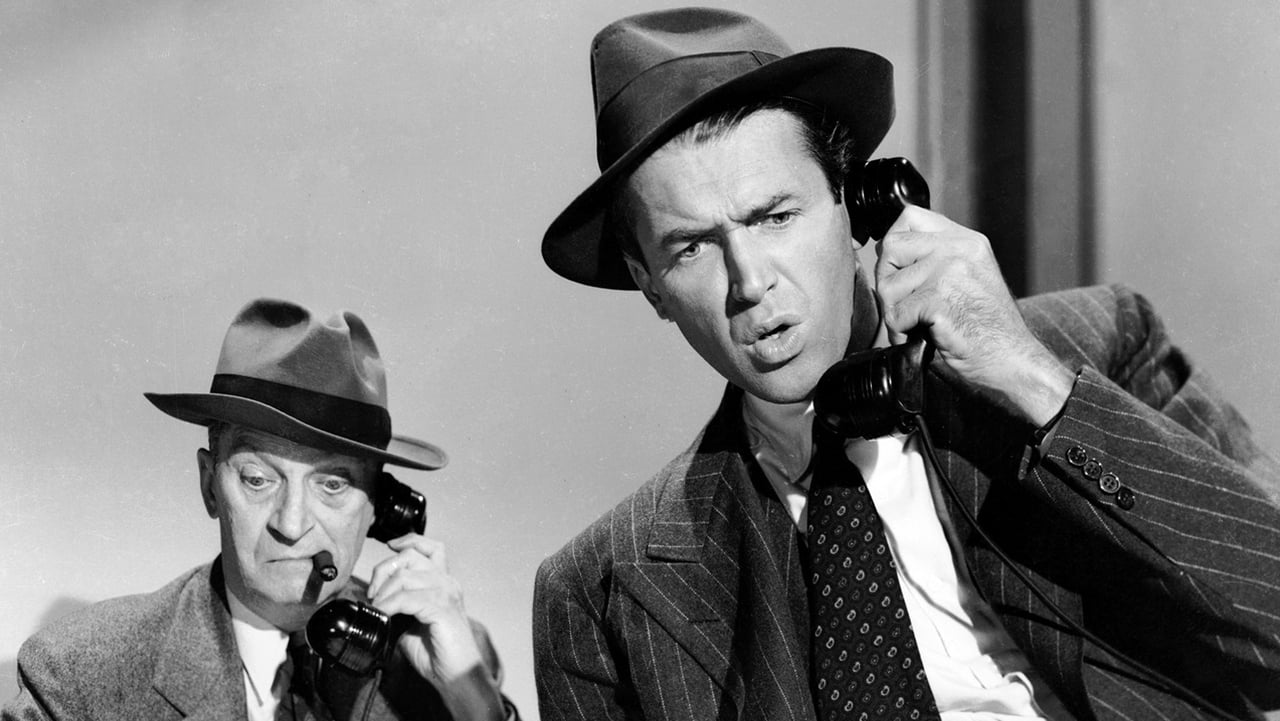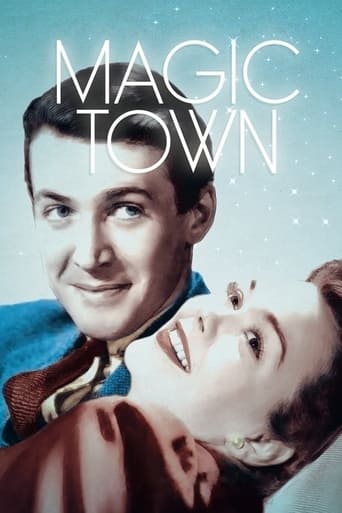

Excellent, Without a doubt!!
... View MoreBlending excellent reporting and strong storytelling, this is a disturbing film truly stranger than fiction
... View MoreLet me be very fair here, this is not the best movie in my opinion. But, this movie is fun, it has purpose and is very enjoyable to watch.
... View MoreThe film never slows down or bores, plunging from one harrowing sequence to the next.
... View MoreProduced by Robert Riskin. Copyright 26 September 1947 by Robert Riskin Productions, Inc. A William A. Wellman Production, presented by Robert Riskin. Released through RKO Radio Pictures, Inc. New York opening at the Palace: 7 October 1947. U.S. release: 12 October 1947. U.K. release: 19 September 1949 (sic). Australian release: 29 April 1948. 9,454 feet. 105 minutes.SYNOPSIS: Polling! Having once worked (briefly) as an interviewer for the Gallup Poll, I must admit that polling and pollsters have a certain interest for me. But this attraction, I'm told, is not shared by the public at large. Which explains why Magic Town - a fantasy about a small American town whose citizenry accurately reflect the feelings and opinions of the whole nation - was not a success.NOTES: Last film for Donald Meek.COMMENT: Robert Riskin wrote some famous comedies for director Frank Capra, including Mr Deeds Goes to Town. What we have here is a Mr Deeds in reverse. Instead of a hayseed moralising in the big city, we have a smart, cynical urbanite inveigling himself into a small town and upsetting its values.Riskin set up his own company to make this film and offered the direction to Capra, who declined. He then decided to direct it himself. He'd previously directed When You're in Love (1937), a moderate success with Grace Moore and Cary Grant. Halfway through shooting, he realised the picture was not panning out, so he approached Capra for help. Capra again refused to become directly involved, but recommended William A. Wellman.Wellman gives a different version of events, stating that he was actively involved from the start. That the movie turned out so badly, he said, was entirely his fault. But I believe that either Wellman's memory is hazy or that he is deliberately offering himself as a scapegoat. In any event, the movie (in my opinion) isn't a tenth as bad as its detractors make out. True this "Capra comedy without Capra" may not seem to be Wild Bill Wellman's cup of tea, but he handles it well. The trouble is that the screenplay fails to develop its good central idea fully and gets itself side-tracked into providing a stellar part for Miss Wyman. Although she gives an ingratiating performance and her scenes with Stewart come across charmingly, she holds up the unfolding of the plot. Padding her role has also obviously been responsible for some considerable cutting of scenes played by other members of the cast - particularly Regis Toomey and Ann Doran, who are introduced without any explanation whatever slap in the middle of the climax! On the other hand, Kent Smith is given an elaborate introduction, but then unaccountably disappears. And it is obvious that the parts of Wallace Ford and E. J. Ballantine were longer when Wellman had finished shooting.Film editors Todd and Wray have succeeded in patching the film smoothly together, despite all the cuts. Attractive photography and appealing art direction are also major assets. In fact production values are triple "A" plus. Producer Riskin delved deep into his own pockets to put all this quality on to the screen. From all reports, he lost a packet. A pity!
... View MoreDirected by William Wyler, this is a light comedy and drama about the quest for taking accurate polls that involves only a small defined population as being an accurate representative of the whole country. The trick is to find that localized population, and hope it stays that way for some years. Thus, it should ideally be conservative in its growth and change in demographics, or so Jimmy Stewart's character thought.It has its comedic moments, such as the chaotic time when it becomes the destination for many outsiders, who want to move there or give their opinions there. The ups and downs in the relationship between Jimmy Stewart, as the chief pollster and Jane Wyman, head of the movement to make Grandview grow, is amusing. But, to me, the funniest bit is the informal competition between Stewart and Jane in reciting "The Charge of the Light Brigade" (Stewart), and "The Song of Hiawatha"(Jane), simultaneously, to each other. That took some talent!The Middletown sociological study which inspired this screenplay was conducted during the 1920s and '30s, by Robert and Helen Lynd. They searched for and found a town with demographics for the Caucasian residents only, similar to the mean for the US as a whole. About 5% of the population was African Americans, who were excluded. It appears that the study in this screenplay also excluded African Americans, Latinos and Asians, as none were seen among the residents or visitors. Thus, neither the original study nor the polls taken in this screenplay necessarily provided an accurate sample of Americans as a whole. This is even more true today, when African Americans, Latinos and Asians make up about 35% of the population. The 2016 presidential election showed that the great divide between small town plus rural areas, on the one hand, and large cities plus their large suburbs, on the other, was the most significant factor in determining whether Republicans or Democrats carried a region or state. Thus, to conduct a reasonably accurate poll on the presidential candidates would require a minimum of inclusion of representatives of these two populations in their proportion in the US as a whole. Also, in the case of presidential elections, one would have to estimate the number of probable voters in each of these categories for each state, because the number of electors/voters is slightly greater for small population states than for large ones. Thus, although Hilary Clinton won the overall popular vote by a very slim margin, Donald Trump won the electoral vote by a substantial margin, partly because the Democrat votes were more concentrated in the big population states, especially California.Interestingly, after the town people realized that their opinions were being tracked as representative of an ideal town for taking polls, they were asked whether they thought a woman could function satisfactorily as president. 79% responded 'yes'. This was considered an outrageous result. As history has shown, in reality, the nation was far from considering the possibility of a woman president.I don't understand why people confused Grandview as a representative town for taking polls with Grandview as an ideal town to live in or near. This confusion of attributes is what precipitated the chaos after a news report labeled Grandview as the ideal(not typical) American town.See this film in B&W at YouTube.
... View MoreI expected to enjoy this Robert Riskin written moral comedic-drama, especially with number one good-guy James Stewart in the lead, but somehow the movie fails to satisfy. Contriving a plot out of Stewart's discovery of a small-town USA which uncannily and perfectly mirrors American public opinion hardly seems an exciting or credible proposition to hang a movie on, never mind Stewart's big-city, small-time pollster's belief that it will make him a millionaire too.From there the film awkwardly pitches big business against ordinary citizens and children against adults in a frankly confusing and awkward plot that takes some swallowing and seems almost communistic in its point of view. It doesn't help that Stewart for once is cast as an ambitious guy on the make but wouldn't you know it, the love of moral champion, local newspaper editor Jane Wyman and his affiliation with the local kids' basketball team turn his head around and between them they resolve everything and live happily ever after.Perhaps in Capra's hands, the film might have taken off and inspired the feel-good vibe I was anticipating. It didn't help that there was little chemistry between the leads (especially when you hear the callous way Stewart's Rip Smith character runs Wyman down in a telephone call to a colleague) and that there were just too darn many eccentric supporting characters too. The direction too was stiff and stilted, never worse than when the film is brought to a juddering halt by two long verses of the awful school song which everyone sings out heartily while Stewart, the outsider, looks on in some discomfort.It's not often I mark down a film from the Tinsel Town Golden Age, especially one starring Stewart, but this sadly doesn't rank among his best and is one I'll not remember in my memory for very long.
... View MoreI have to admit the premise behind Magic Town was a really good and original one. The fact that small time pollster James Stewart discovers a town that is a microcosm of American thinking. What a shortcut, just move in there and poll the citizens on any question. But you have to do it with subterfuge and the town can never have any marked growth of any kind or the goose that's laying Stewart's golden egg is cooked.Enter Jane Wyman, acting editor of the small town paper who has some ideas about getting the town to grow. That sets up the conflict with Stewart and then the romantic complications set in. Their romance and their differing agendas set the tone for the rest of the film.I think with a lighter touch this could have been a classic film. It's not a bad film, it's moving in spots, but the subject matter doesn't lend itself to Frank Capra type populism. I'm sure this is a property that Capra himself must have rejected.Stewart and Wyman are ably supported by the usual group of great character performers that usually populate a Capra film. William Wellman directed this and I think he was out of his element. He's so much better in action films.It's also so old fashioned in its view of small town America. I can't believe that such a place like Grandview could possibly exist. Think about it, a cross section of America would have its bad people too among the population. Not a bad person in the whole town. And they even list a U.S. Senator in their population. That would in and of itself make it atypical by his mere presence. In fact when this film was made Harry Truman was president and certainly Independence, Missouri has never been "typical" since he came to political prominence.My favorite scene is the dance where the whole crowd except the outsider Stewart sing the high school song. It's sung to the tune of I'll Take You Home Again, Kathleen. It's a nice moment and it demonstrates just how alien big city slicker Jimmy Stewart is in this environment. It's good, but it does tip over into the saccharine.Both Stewart and Wyman have certainly done better, but fans of both these performers will like it. But can you imagine what someone like Preston Sturges would have done with this material?
... View More